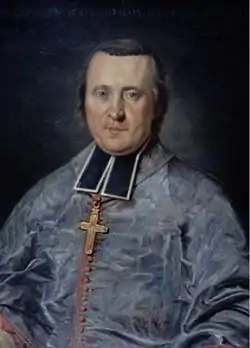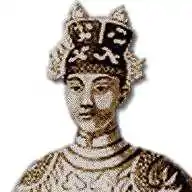Chaophraya Aphaiphubet (Baen)
Chaophraya Aphaiphubet (Baen) (Thai: เจ้าพระยาอภัยภูเบศร (แบน), Khmer: ចៅពញាអភ័យធីបែស បែន, ?–1811), also known as Chaofa Talaha (Baen) (Khmer: ចៅហ្វាទឡ្ហៈបែន, Thai: เจ้าฟ้าทะละหะ (แบน)) or Chau Hua Pen (Khmer: ចៅហ្វ៊ាបែន), was a Cambodian officer, later a Siamese governor. He was known in Vietnamese contexts as Chiêu Thùy Biện (昭錘卞).
Chaophraya Aphaiphubet (Baen) | |
|---|---|
| เจ้าพระยาอภัยภูเบศร (แบน) ចៅពញាអភ័យធីបែស បែន | |
| Chaofa Talaha of Cambodia | |
| In office 1782–1794 | |
| Preceded by | Chaofa Talaha (Mu) |
| Succeeded by | Chaofa Talaha (Pok) |
| Governor of Battambang | |
| In office 1794–1810 | |
| Succeeded by | Phraya Aphaiphubet (Baen) |
| Personal details | |
| Born | ? Cambodia |
| Died | 1811 Battambang |
Baen was a Khmer noble with the title Oknya Yomreach (ឧកញ៉ាយោមរាជ, or Phraya Yommarat พระยายมราช in Thai). In 1782, Baen and Oknya Kalahom (Suos) (ឧកញ៉ាក្រឡាហោម (សួស)) captured the pro-Vietnamese regent Talaha (Mu) and had him executed. Soon Baen came into conflict with his ally, Suos. Baen assassinated Suos.[1] Knowing Suos was killed, Cham rebels attacked Phnom Penh,[2] forcing Baen, King Ang Eng and Oknya Kalahom (Pok) flee to Battambang then to Siam.[1] Rama I had Ang Eng captured and deported to Bangkok. During the king's absence, Baen served as the regent and worked for Siam, and was promoted to Chaophraya Aphaiphubet.
In 1785, king Rama I sent Siamese army to attack Gia Dinh, Baen recruited 5000 Cambodian soldiers to support Siamese army.[3] Later, he came into conflict with the Vietnamese ruler Nguyễn Ánh ("Chao Anam Kok" in Thai). He was accused by Nguyễn Ánh in 1790.[4]
Ang Eng was allowed to return to Oudong in 1794. But the Cambodian court split into two factions, one supported Ang Eng, the other supported Baen. In order to prevent Cambodia from turmoil, Rama I ordered Baen to leave Oudong. Battambang and Siem Reap were separated from Cambodia.[5] Baen was appointed a chao muang (governor) of this two provinces under Siamese suzerainty.[6] He died in 1811.[1]
Baen was also the founder of House of Abhaiwongse.[7]
Family
- Sons:
- Phraya Aphaiphubet (Ros): 3rd governor of Battambang
- Phra Ang Kaew (Ma): official of Cambodian court
- Phra Narintharaborirak (Um): official of Battambang
- Phra Yokrabat (Dom): official of Battambang
- Luang Muang (Maw): official of Battambang
- Luang Sachakhom: official of Muang Tanod, subordinate town of Battambang
- Kong
- Ket
- Daughters:
- Mom Yu: married a member of Siamese royal family
- Naek Thep (นักเทพ) : concubine of Ang Chan II; also mother of Princess Ang Baen
- Mee (อำแดงมี)
- Pok (อำแดงปก)
- Paen (อำแดงแป้น)
- Nuam (อำแดงนวม)
- Mied (อำแดงเมียด)
- Kaew (อำแดงแก้ว)
See also
References
- "ប្រវត្តិសាស្ត្រប្រទេសកម្ពុជា-ជំពូកទី៣" (in Khmer). 14 March 2008.
- ศานติ ภักดีคำ. เขมรรบไทย. กทม. มติชน. 2554. หน้า 272
- Tương quan Xiêm – Việt cuối thế kỉ XVIII
- เจ้าพระยาทิพากรวงศ์ (ขำ บุนนาค). "59. เจ้าอนัมก๊กกล่าวโทษเจ้าพระยาอภัยภูเบศร์". พระราชพงศาวดารกรุงรัตนโกสินทร์ รัชกาลที่ ๑.
- David K. Wyatt (2003). Thailand: A Short History. Yale University Press. p. 140. ISBN 0-300-08475-7.
- Puangthong Rungswasdisab (January 1995). "War and trade: Siamese interventions in Cambodia, 1767-1851". University of Wollongong Thesis Collection 1954-2016: 170.
- Puangthong Rungswasdisab (January 1995). "War and trade: Siamese interventions in Cambodia, 1767-1851". University of Wollongong Thesis Collection 1954-2016: 185.


